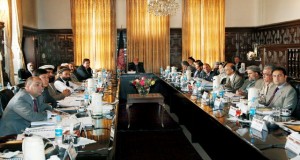State Department, US Press Hide Important Karzai Statement on Bilateral Security Agreement

Karzai addressing his cabinet. Photo is from the web posting of Karzai’s statement on the Bilateral Security Agreement.
Although there really is only one controlling issue in the quest to sign a new SOFA (Status of Forces Agreement) BSA (Bilateral Security Agreement) governing US troops in Afghanistan after official NATO actions conclude at the end of next year, Afghan President Hamid Karzai seems to be taking perverse pleasure in taking sweeping actions and making broad statements that seem to alternately encourage and then discourage those seeking to finalize the agreement. As I explained late last year, the US will keep troops in Afghanistan after 2014 only if they are granted criminal immunity. Without immunity, the US will withdraw fully just as it did in Iraq when immunity was denied there.
Recall that Karzai called for all US Special Forces to leave Maidan Wardak province back in late February. Just about three weeks later, he appeared to relent somewhat and it appears that SOF only left one district. On May 9, Karzai surprised everyone by announcing that the US could maintain nine bases in Afghanistan after 2014, apparently catching the US off-guard. In response, the US claimed they want to house troops at Afghan bases, because there is no desire for permanent US bases in Afghanistan.
Lest those negotiating the agreement get too encouraged by the base proposal, though, Karzai has now placed what appears to be a completely impossible precondition on signing the agreement, but citizens in the US would be hard-pressed to know anything about it. At the State Department briefing on May 17, there was an acknowledgement that Karzai had released a statement, but we don’t learn what Karzai actually said from the exchange with a reporter:
Walitz, do you have something?
QUESTION: Afghanistan.
MS. PSAKI: Mm-hmm.
QUESTION: President Karzai’s office issued a brief statement today that he spoke to Secretary Kerry. Do you have any details on the readout, what were the issues they discussed?
MS. PSAKI: I do, I do.
QUESTION: Thank you.
MS. PSAKI: So Secretary Kerry spoke this morning with President Karzai. They discussed our joint progress on the bilateral security agreement, border issues, and the status of the ongoing peace process. Secretary Kerry also affirmed that he and President Karzai remain committed to the same strategy and the same goal of a stable, sovereign Afghanistan, responsible for its own security and able to ensure that it can never again be a safe haven for terrorists.
QUESTION: Do you know when this BSA will be signed? What’s the status on that?
MS. PSAKI: I don’t have any specific update on that. Again, it’s obviously something that we continue to work on, work very closely on at many levels with the Government of Afghanistan.
So neither Jen Psaki, the State Department spokesperson, nor the reporter referred to as Walitz bothers to actually mention what Karzai said in his statement that was released. Here is what Karzai’s statement says regarding the bilateral security agreement:
On the bilateral security agreement that the United States is seeking to sign with Afghanistan at the soonest, President Karzai has said to the US Secretary of State that Afghanistan would sign the agreement only if conditions of the Afghan people were accepted and the first precondition is to bring peace and to end war in Afghanistan.
President Karzai clarified to John Kerry, it was impossible for the people of Afghanistan to be pleased with signing of the security agreement whereas violence and war continue in the country.
The President said to the Cabinet meeting that the security agreement if signed without the return of peace, and with continuation of violence and bombings means that the people of Afghanistan would continue to suffer every day from blasts, terrorist attacks and foreign invasions.
President Karzai added, the fundamental precondition of Afghans for the agreement is bringing peace, security and stability to Afghanistan if this is fulfilled, then the Afghan people would agree with signing of the agreement with the United States.
Just wow. Karzai has said he will not sign the agreement while “violence and war” continue in Afghanistan, and neither the “press” nor the Department of State “spokesperson” found it necessary to put that particular tidbit into the public record. I can find no reports on Karzai’s statement in the US press. It has been reported by ToloNews in Afghanistan. It would appear that when the State Department gives its own “readout” on a conversation, it is very important to check other original sources for what really took place in the conversation.
[Brief note on dates: the reporter mentions that Karzai’s office released a brief statement “today” that Karzai had spoken to Kerry. From the records I can find, this press briefing took place at 12:30 pm in Washington on May 17, which would be 9 pm in Kabul on the same day. The statement from Karzai’s office that I quote here is dated May 18, so it is unclear whether Walitz had seen the full Karzai statement at the time the question was posed. I can find no reference to the Karzai-Kerry conversation on the Karzai website that is dated May 17.]
